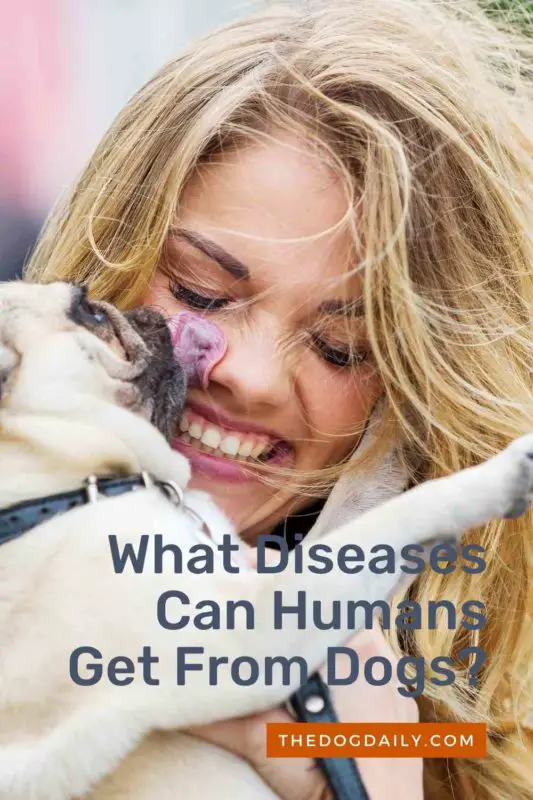Can Germs be Spread Between Dogs and People?
If you share food with your beloved dog, make room in your bed for the happy tail-wagger or allow a face lick or two, you’re not alone.
Many dog owners share in this close-proximity manner with their beloved pups. But are you placing your health at risk when you do so? A study by Kansas State University Assistant Professor Kate Stenske, DVM, Ph.D., offers insight into how germs are spread between dogs and their owners.
How Do Dogs Spread Germs?
Dr. Stenske found that owners who bond in such ways with their dogs are no more likely to share the same strains of E. coli bacteria with their pets than dog owners who are more reserved in their interactions. Just 10 percent of the dog-human pairs shared the same E. coli strains, says Dr. Senske, whose findings have been accepted for publication in the American Journal of Veterinary Research.
However, Dr. Stenske and other experts point out that this study focused on just one type of bacteria. Dogs can transmit other diseases, such as ringworm, hookworms, roundworms, and campylobacteriosis, an infectious bacterial disease. Aside from keeping your dog in prime condition with regular veterinary visits, a good diet, and exercise, there is one thing that you can do by yourself to safeguard against both dog-and human-spread diseases: wash your hands. Dr. Stenske documented an association between antibiotic-resistant E. coli and owners who didn’t wash their hands after petting their dogs or before cooking.
How Can I Prevent My Dog From Making Me Sick?
Proper handwashing tops these best health practices recommended by experts:
-
Wash Your Hands
Hand washing is the most important thing we can do to minimize the spread of any bacterial infection. It seems pretty basic, right? However, it’s a matter of remembering to do so at the correct times and in the proper manner. Wash your hands after petting your dog, as well as before and after handling your dog’s food. Too many of us tend to give a quick wash of the palms. “My favorite is good old soap and water and a good 10-second scrub,” Dr. Stenske says. Don’t forget to wash the tops of your hands and your nails, then dry very well.
-
Avoid Face-licking
Experts still advise against that exuberant, sandpaper-rough face-licking dogs occasionally deliver. “I don’t encourage it in my dog, and I always try to wash my face afterward,” says Dr. Peter Rabinowitz, MD, MPH, Assistant Professor of Medicine at the Yale University School of Medicine. Young people, the elderly, or the immunocompromised can be more at risk for obtaining an illness from a face-licking dog.
Young puppies and sick dogs are more likely to acquire germs from you in this manner as well. For instance, human noses can carry the germs for certain bacterial infections and may pass them along to our dogs. The young are at risk because their immune systems aren’t fully developed. The elderly and the ill might have weakened immune systems.
-
Maintain Your Dog’s Hygiene
Give your dog regular baths to help minimize the spread of germs. Keeping your dog free of ticks and fleas further plays a role in ensuring your dog’s health and your own.
-
Maintain Your Dog’s Good Health
Regular veterinarian visits, updated shots, and deworming, when necessary, are all essential.
-
Feed Your Dog Indoors
Avoid sharing food with your dog and don’t allow it to hunt; feed on garbage; or eat raw or undercooked meat, milk, or eggs. Also, feed your dog inside. Food fed outdoors can attract wildlife, increasing your dog’s risk for rabies or other diseases that wild critters can spread.
-
Scoop the Poop Safely
Cleaning up is one part of dog ownership no one relishes, but being meticulous about how you clean up your dog’s waste is critical, say the experts. After all, E. coli is spread through contact with contaminated feces or by contact with something
the contaminated waste has touched. Use a scooper and gloves, making sure to wash your hands afterward. Be sure to clean your dog’s fur if your dog happens to mess his coat a bit.
We don’t live in a sterile world, and you want a loving relationship with your dog. Numerous other studies report that owning a dog has positive health effects for us humans, so this one area of cleanliness concern represents a rare yet important exception to the general rule. “We should not be afraid of our dogs,” says Dr. Stenske. “I’m very close with my dog. You use common sense. We should be clean ourselves, and we should keep our pets clean, too.”
Article written by Author: Kim Boatman


เพิ่มยอดไลค์จริงได้ง่าย ปลอดภัย